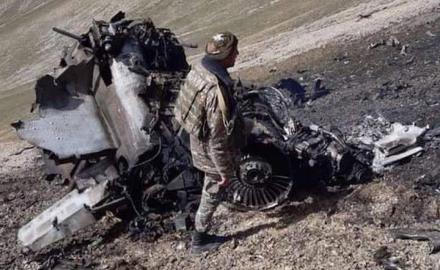Emil Filtenborg and Stefan Weichert are independent journalists based in Ukraine. In a weekly series for IranWire, they examine the landscape of disinformation in Russia and some of the false information that has emanated from the country since the outbreak of coronavirus.
Taking place as it is in the Kremlin’s backyard, it was only a matter of time before the Nagorno-Karabakh conflict came into the crosshairs of Russian disinformation actors. First this week came Spanish Sputnik, which published a panic-inducing article about the fight being an attempt to bring war to Russia’s doorstep.
The conflict, the Sputnik article claims, is a regional one with many external actors weighing in. This is a fair point, since almost everyone has been asking both sides to step down, while Turkey has sent military aid to its defense partner, Azerbaijan.
But the article then goes on to state that the US and Turkey don’t want to “lose positions in that region,” while Russia is described as an agent of peace in the Middle East, “promoting dialogue between the opposition factions and the government of Bashar Assad in Syria.”
From this supposed vantage point, Sputnik surmises that “the escalation between Baku and Yerevan could be directed against Moscow, where the objective is to take the war to what – for Russia – is a strategic and sensitive territory for security on the southern flank of the Eurasian giant”.
Of course, Sputnik makes no mention in its article of being directly owned and controlled by that same “Eurasian giant”. Its point is a curious one: while there is no doubt that a war between Baku and Yerevan would have implications for Russian security, the conflict between Armenia and Azerbaijan over Nagorno-Karabakh dates back to the late 1980s, with other clashes between the two countries dating back even further. There have been several flare-ups recently – most notably in 2016 and 2018 – though none have been as severe as this.
One hundred years ago this year, Azerbaijan also claimed Karabakh in a war with Armenia. Azerbaijan as we know it was founded after the collapse of the Russian Empire in 1918, meaning that the Nagorno-Karabakh conflict essentially goes back to the beginning of the Azerbaijan Democratic Republic. The conflict has far deeper roots than contemporary geopolitical strategies.
Azerbaijan/Armenia Conflict ‘Favors the US’
It is not only Spanish Sputnik that has been pushing the narrative that the Nagorno-Karabakh conflict serves anti-Russian interests, but its sister sites Sputnik Belarus, Sputnik Lithuania and Sputnik Armenia. These arms of the Kremlin’s media empire have made the much more specific claim that the conflict will benefit the United States.
“One gets the impression that someone is trying to pull Russia into a larger war in Caucasus,” one such article claims, “to divert forces and resources from Belarus, Syria, Nord Stream 2 and other points of geopolitical confrontation.
“The direct participants in the conflict are swapping out Moscow, knowingly or unknowingly... There are also geopolitical risks associated with the external projection of power from a number of Western countries with egoistic interests in the Caucasus.”
The article later appears to insinuate that the United States somehow has an interest in the conflict or even a hand in it. “The American urge to dominate Russia’s borders in the economic and military sphere is aligned with a range of planned armed conflicts of medium intensity in the Caucasus and other regions,” it declares. “They do not feel sorry for the people in the CIS-countries, and Russians resources will be redirected to eliminate the military threat. That means Moscow will have less strength to compete with Washington in other parts of the world.”
The English-language website South Front, a regular publisher of disinformation registered in Russia, has made similar pronouncements. “They (the US) see the Nagorno-Karabakh region as a point of possible conflict between Russia and Turkey (which is useful to promote the US agenda in the Greater Middle East),” it wrote. “The instability in South Caucasus, close to the borders of Russia and Iran, also contributes to the geopolitical interests of the United States.”
“For years,” South Front added, “Russia has been the only guarantor of Armenian statehood and the only force capable to rescue it in the event of a full-scale Azerbaijani-Turkish attack.” The writer is referring here to the defensive pact that exists between Russia and Armenia.
The idea of a guarantor is archaic in itself. But in addition, because of Armenia’s United Nations membership, other countries are obliged to “refrain in their international relations from the threat or use of force against the territorial integrity or political independence of any state.”
All these articles fail to mention that Trump, Macron and Putin have issued a joint statement condemning the escalation of violence in the area and calling for the fighting to stop.
Also in this series:
Putin Tries to Rewrite War History to Assert Russia's Position on the World Stage
Kremlin Has the Upper Hand as Covid-19 Puts Independent Media Under Pressure
Russian Media Takes Aim at Belarus Protesters and Claims Germany Poisoned Navalny
Russia Finances Political Party Fueling Anti-Turkish Sentiment in Georgia
visit the accountability section
In this section of Iran Wire, you can contact the officials and launch your campaign for various problems

























comments